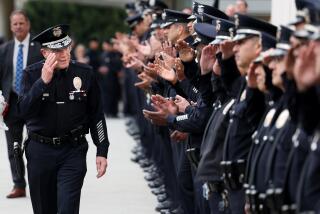LAPD Overseer Requests Larger Staff
The watchdog agency charged with overseeing police performance lacks the staff to thoroughly monitor the Los Angeles Police Department and institute reforms dictated by a federal consent decree, the Police Commission’s inspector general said.
Inspector General Andre Birotte and the Police Commission’s president and vice president outlined their concerns last week in a letter to Mayor James K. Hahn. The letter was obtained by The Times.
Birotte, who will bring the issue to police commissioners today, said that because of the city’s hiring freeze and budget shortfall, his office is struggling to institute the required widespread reforms.
The letter to Hahn requested that five key positions be filled in the inspector general’s office so that the agency could meet the June 15 deadline for the reforms.
The consent degree was worked out in 2001 by the city and the Department of Justice after the federal government had accused the LAPD of a pattern of excessive force and false arrests.
The inspector general’s team must examine a variety of incidents and concerns, including officer-involved shootings, confidential informant files, gang-related statistics and arrest procedures. The consent decree requires reports with specific deadlines, Birotte said.
“We are struggling every day to handle the volume of work,” Birotte said. “We are struggling with the timeliness of our reports. We aren’t going to skim these investigations.”
A federally appointed court monitor’s report just issued warns that because of staff shortages, the inspector general’s office will not complete the required work on time and the city will be out of compliance with the decree. It is his third such warning.
“The inspector general’s effectiveness continues to be compromised by resource constraints, as the IG is not completing his oversight functions on a timely basis,” wrote federal monitor Michael Cheraksky, head of the security consulting firm of Kroll Associates, in his last quarterly report, in February.
“This threatens to undermine the [Police] Department’s ability to achieve substantial compliance by the end of the third year of the five-year consent decree,” he wrote.
Under the decree, the LAPD must be in substantial compliance for a two-year period ending June 15, 2006, to avoid a costly extension.
“Probably the most singular important aspect of police reform is the inspector general, and the concerns here are getting the commission’s full attention,” said Police Commission President David Cunningham III.
Though acknowledging the city’s potential $200-million budget deficit, Cunningham said that if the inspector general gets no new employees, it could cost the city far more than their salaries. By some estimates, administering the consent decree costs Los Angeles as much as $50 million annually.
Cunningham said that eventually the inspector general’s office will need skilled legal specialists with litigation or law enforcement backgrounds to investigate police conduct.
Michael Gennaco, a former federal prosecutor who heads the Los Angeles County Office of Independent Review, which oversees the Los Angeles County Sheriff’s Department’s conduct, agreed. “This kind of work requires a detailed knowledge of subpoenas, warrants and other legal issues,” he said.
Gennaco said that when he organized the watchdog agency in 2001 he chose a smaller but knowledgeable staff of six attorneys with backgrounds in investigating law enforcement.
The city inspector general’s office includes two assistant inspector generals, four veteran investigators and staff drawn largely from City Hall’s civil service ranks.
To improve the staff’s level of legal expertise, Birotte said, he is asking that at least two analyst openings be converted to investigator positions, with those employees having no experience in the city’s civil service system. Council members Cindy Miscikowski and Jack Weiss led calls last year for the Police Commission to expand the inspector general’s powers in its misconduct probes.
Since the arrival of Chief William J. Bratton in 2002, Birotte has been more involved in internal LAPD examinations. The federal monitor recently praised Birotte’s increasing role in police investigations of use of force by officers.
Where once the inspector general had been banished from such LAPD reviews, today he not only attends meetings but can ask questions.
“Andre is on board from the beginning on these investigations,” said Deputy Chief Michael Berkow, head of the LAPD’s Professional Standards Bureau, which investigates all civilian and internal complaints.
More to Read
Sign up for Essential California
The most important California stories and recommendations in your inbox every morning.
You may occasionally receive promotional content from the Los Angeles Times.











